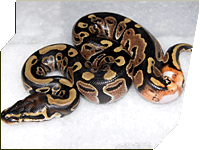 Genetic
Morph: Ringer, Bullseye, "Poor
Man's Pied" Genetic
Morph: Ringer, Bullseye, "Poor
Man's Pied"
Status: Proven
When: many produced over the years
- 1997 to present
By Whom: Many Ringers have been
produced through line-breeding and randomly
over the years.
Ringers........the
"Poor Man's Pied"...........I
have been working with Ringers since the
late 90s...........so have other breeders.
What I have found is that I could produce
Ringers from breeding a Ringer male to 'het
daughters"............I also could
produce Ringers from the first breeding........so
the Ringers produced "simple recessive-like"
and 'dom-like"???
I
and other breeders produce Ringers at random
each season.....I have produced the most
Ringers out of Piebald to het Piebald breedings
( several seasons in a row )..........I
have also produced Ringers from other mutations,
Lavender Albino and Lesser among others.
Most
Ringers have the "white blotch or ring"
pattern down by the tail...........some
do have the white area further up the body.......some
of the white will cross over the top............some
will not. The white is usually always bordered
in a very pretty orange color.....some white
areas are large coming up the sides and
across the back........some are barely noticeable
and hidden on the belly scales.
Ringers
are also called "Bullseye"..........white
patches, white rings............white circles...........it
all get's lumped into the 'Ringer Category......
As
far as it being "proven"............I'd
say sure it is.........it's not totally
predictable in all cases, but it has been
proven to be produced within a certain bloodline
of line breeding. I don't know of any breeder
really taking the project any further than
producing a few through line breeding.
This
trait is not as much of a mystery as the
"Classic Jungle", yet it seems
to "pop up" the same way...........both
the Ringer and Classic Jungle are "
stains" , "artifacts" or
"bi-products" of breeding ball
pythons if you ask me...........
You
can read more "out-dated" material
about the Ringers on the "Ringer
Page" in the RDR Collection section.
Text
by Ralph Davis
|